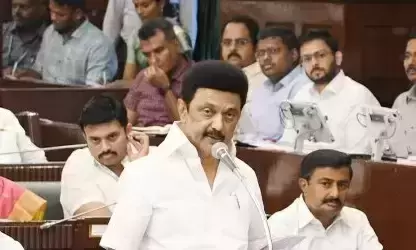
Tamil Nadu Assembly passes resolution seeking withdrawal of Waqf Bill
text_fieldsChennai: The Tamil Nadu Legislative Assembly on Thursday unanimously passed a resolution urging the Union government to withdraw the Waqf (Amendment) Bill, 2024, citing concerns that it undermines the interests of Muslims in the country.
While all major political parties, including the AIADMK, supported the resolution, the BJP staged a walkout ahead of the vote.
Chief Minister M.K. Stalin, who moved the resolution, said the Indian Constitution guarantees all religious groups the right to practice and preserve their faith, and it is the duty of a democratically elected government to protect these rights.
He expressed strong opposition to the proposed amendments to the Waqf Act, 1954, stating that they would severely impact Muslim minorities.
CM Stalin also noted that DMK representatives A. Raja and M.M. Abdullah were not allowed to share their opinions on the proposed changes to the Waqf Act during Joint Parliamentary Committee discussions.
In a display of democratic courtesy, CM Stalin also requested Speaker M. Appavu to allow BJP leader Vanathi Srinivasan to express her views on the matter.
Vanathi Srinivasan defended the bill, stating that the Centre aims to address irregularities in Waqf property management across various states. She argued that the amendments aim to protect the interests of marginalised Muslim communities and ensure better representation for women.
However, Tamil Nadu Law Minister S. Regupathy countered her claims, stating that the views of certain JPC members were ignored during discussions.
He further described the Waqf Amendment Bill as an “economic assault” on the Muslim community.
PMK leader G.K. Mani said the bill should only proceed if the Union government is able to build a consensus among all stakeholders.
AIADMK member S.P. Velumani also voiced support for the resolution, adding to the united front against the bill.
The Assembly concluded by reiterating its demand that the Union government fully withdraw the controversial Waqf (Amendment) Bill, 2024.
(inputs from IANS)























